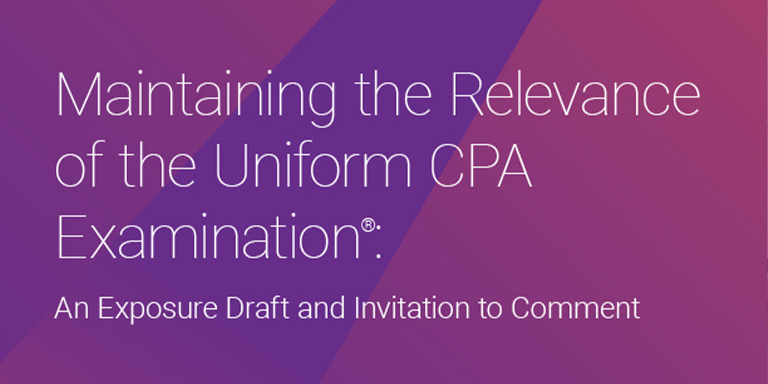Invitation to Comment on Exam Released
SHARE:
While other groups are looking at what the future Uniform CPA Examination may be like, keeping the current Exam valid, reliable and relevant has also been a charge of the Board of Examiners and the AICPA Exam Team. The results of the AICPA’s Practice Analysis were released in mid-December along with changes to be operational in the Uniform CPA Examination administered sometime in 2021. Comments on the exposure draft (/content/dam/aicpa/becomeacpa/cpaexam/downloadabledocuments/2019-practice-analysis-report.pdf) and the invitation to comment items requiring more research are requested by April 30, 2020 and should be sent to [email protected]. NASBA’s CBT Administration Committee, chaired by Tyrone Dickerson (VA), and Executive Directors Committee, chaired by Grace Berger (MT), are drafting a response to the exposure draft to be ready by March. The State Boards are encouraged to consider the exposure document and the NASBA comment letter prior to sending their own comments to the AICPA. Revisions to the CPA Exam Blueprint would need to be approved no later than December 31, 2020.
The Practice Analysis identified three ways technology is impacting the competencies required of newly licensed CPAs:
- Understanding business processes from inception to completion including automated aspects, risk identification and internal control mapping.
- The need for a digital and data-driven mindset and the use of data analytics, and
- Increased reliance on System and Organization Controls for Service Organizations: Internal Control over Financial Reporting (SOC 1®) reports.
While the Practice Analysis found reliance on SOC 1 reports has dramatically increased, which has required auditors for even modestly -sized clients to obtain and evaluate multiple SOC 1 reports, the research did not support that a significant number of newly licensed CPAs were involved in performing the underlying procedures that support the issuance of a SOC 1 report. That is being done by specialists or those with significant experience. AICPA is continuing to monitor this area.
Another aim of the Practice Analysis was to identify existing Exam content that might be less important to the newly licensed CPA, so that the Exam could focus on those areas that are most critical to the new licensee’s practice. This Practice Analysis does not anticipate major structural changes to the present four-section examination. The AICPA contracted with the American Institutes for Research to lead focus groups. Nearly 150 CPAs participated in virtual rating panels on what should be included in the Exam. Then confirmation panels were held for each of the four Examination sections, with nearly 60 CPAs participating in the virtual confirmation panels. Several topics are suggested for removal as: “The change is proposed to focus the CPA Exam on assessing the critical knowledge and skills needed by newly licensed CPAs.” The exposure draft explains these topics would ordinarily be beyond the scope of the newly licensed.
Respondents to the Practice Analysis document are being asked:
1. Do the findings of the Practice Analysis align with the changes you see impacting the newly licensed CPA’s practice?
2. Do you agree with the proposed Exam changes?
3. Are there other areas affected by technology beyond the findings identified in the Practice Analysis?
4. Do you believe there is additional content that should be removed from the CPA Exam?
5. Requiring additional research for implementation not before 2022: A- Should the essay question be removed? B- Should accounting for state and local governments continue to be assessed in the CPA Exam?







